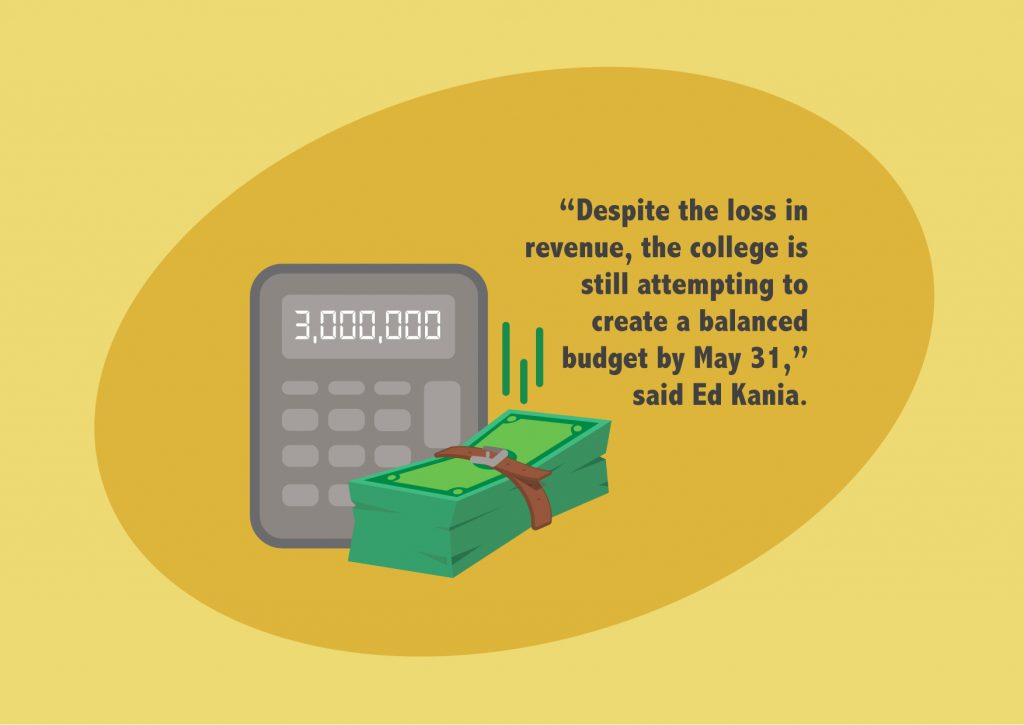Faculty search frozen, other measures taken to compensate for loss

Roughly $3 million in room and board and dining costs have been refunded to Rollins students who are now participating in distance learning. This financial loss to the college strains the annual budget, causing administration to pause its search for open faculty positions and to prepare for next steps.
College Financial Loss
While President Grant Cornwell initially reported a $3 million loss, Rollins is projected to lose more money due to summer cancellations.
The cancellation of on-campus summer programs, such as the Duke TIP program, Maymester courses, and various conferences, could cost Rollins an additional $1 million, said Cornwell.
“Maymester is going to be entirely virtual, and anything else that was scheduled for the summer is going to be virtual. I’m hoping that we are fully back to campus in the fall,” said Cornwell.
The financial loss from Maymester classes comes from the potential revenue from dining plans and on-campus housing fees.
The college will not save money from the decision to carry out distance learning, since faculty are still paid the same wages for teaching courses, said Cornwell. Pay has been guaranteed to both faculty and staff through the end of this fiscal year, which ends May 31.
Plans for the Future
In order to get a diverse understanding of how to handle the budget for the following fiscal year, Cornwell has created a financial strategic planning task force made up of faculty and staff from across campus.
The task force is made up of 20 people including Dean of Students Leon Hayner, Associate Vice President of Financial Aid Steve Booker, Associate Professor Dan Chong, and Vice President for Institutional Advancement Laurie Houck. The task force is led by Ed Kania, vice president for business and finance and treasurer.
“We, like all other colleges right now, are focused on determining and projecting the potential financial impacts of COVID-19 over the next six to twelve months. This work will continue in the coming months,” said Kania.
Despite the loss in revenue, the college is still attempting to create a balanced budget by May 31, said Kania.
Into the next fiscal year, the main concerns for Rollins include securing a new freshman class that is willing and capable of paying tuition and keeping a high retention rate for returning students.
“What I’m really worried about is that so far our admissions deposits are exactly on track with last year, but this is having such a terrible blow on the economy that I am really worried about affordability for some families,” said Cornwell.
Both new and returning students are facing possible economic struggles due to COVID-19, which can make the monetary strain of paying college tuition difficult to bear.
“We want to work with families to make it possible for students to attend as first year students or persist as returning students,” said Cornwell. As of now, students are encouraged to work with staff on a case-by-case basis to discuss any financial hardships.
For students concerned that their financial struggles may impede their return to Rollins, they are advised to contact Booker at sbooker@rollins.edu.
Faculty Positions
To help aid the loss of revenue, Rollins has temporarily halted its search for additional faculty and staff positions.
“We’ve stopped hiring, but there still may be positions that are absolutely critical to the college, and if the person leaves, we are going to [have to] replace them. But for the most part, we have completely stopped hiring,” said Cornwell.
Although pay has been guaranteed to both faculty and staff, what happens next to faculty salaries is still unknown.
“What we have to do with everybody’s salaries or earnings will be entirely contingent on our revenue stream,” said Cornwell. “The impacts will have to be exactly correlated with the loss of revenue.”
















[…] The Strategic Planning Task Force, which is in charge of planning contingencies for COVID-19, expected the budget cuts. Its projections for decreased enrollment and retention rates, as well as decreased funds from summer conferences and programs, led to an estimated multi-million dollar revenue loss. […]